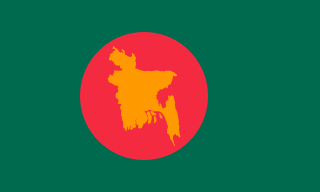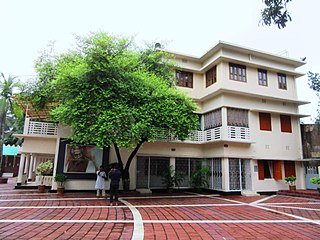
Politics of Bangladesh takes place in a framework of a parliamentary representative democratic republic, whereby the Prime Minister of Bangladesh is the head of government, and of a multi-party system. Executive power is exercised by the government. Legislative power is vested in both the government and parliament. The Constitution of Bangladesh was written in 1972 and has undergone seventeen amendments.

The Bangladesh Nationalist Party is one of the major political parties in Bangladesh. It was founded on 1 September 1978 by the late Bangladeshi president Ziaur Rahman, after the presidential election of 1978, with a view of uniting people with a nationalist ideology. Following Rahman's assassination in 1981, his widow, Khaleda Zia, took over leadership of the party and presided as chairperson until her imprisonment, in 2018. Since then, Tarique Rahman, the son of Rahman and Zia, has served as acting chairperson and has run the affairs of the party from London.

The Bangladesh Awami League, often simply called the Awami League or AL, is one of the major political parties in Bangladesh, being the ruling party since 2009.

Hussain Muhammad Ershad was a Bangladeshi military officer and politician who served as the president of Bangladesh from 1983 to 1990, a time many consider to have been a military dictatorship.

The Bangladesh Krishak Sramik Awami League (BaKSAL) (Bengali: বাংলাদেশ কৃষক শ্রমিক আওয়ামী লীগ, English: Bangladesh Worker-Peasant's People's League; বাকশাল) was a political front comprising the Bangladesh Awami League, the Communist Party of Bangladesh, the National Awami Party (Muzaffar) and Jatiyo League.
Syed Faruque Rahman was a coup member involved in toppling the Sheikh Mujib regime in Bangladesh. He was convicted and hanged on 28 January 2010 along with co-conspirators Sultan Shahriar Rashid Khan, A.K.M. Mohiuddin Ahmed, Mohiuddin Ahmed, and Mohammad Bazlul Huda in Dhaka Central Jail, Old Dhaka, for the murder of Sheikh Mujibur Rahman, the founder and first President of Bangladesh. Syed Faruque Rahman and his close ally Khondaker Abdur Rashid were the chief organisers of the assassination of Sheikh Mujibur Rahman on 15 August 1975. He was 2IC of the 1st Bengal Lancers Regiment of the Bangladesh Army who led a group of junior army officers in-order to overthrew the regime of Sheikh Mujibur Rahman and installed Khondaker Mushtaque Ahmed as President of Bangladesh.

The Jatiya Samajtantrik Dal is a political party in Bangladesh. The party was founded by Serajul Alam Khan.
Jail Killing Day is observed by the Awami League (AL) of Bangladesh and many other political organisations on 3 November every year. It commemorates the killing of four Awami League and national leaders : former Vice-President Syed Nazrul Islam, former Prime Minister of Bangladesh Tajuddin Ahmed and Captain (Rtd.) Mansur Ali, and former Home Minister A H M Quamruzzaman on this date in 1975.

The 2006–2008 Bangladeshi political crisis began as a caretaker government (CTG) assumed power at the end of October 2006 following the end of term of the Bangladesh Nationalist Party administration. The BNP government increased the chief justice's retirement age in an unconstitutional way to bias the appointment of the head of the caretaker government. CTG manages the government during the interim 90-day period and parliamentary elections. Political conflict began with the alleged appointment of a Chief Advisor, a role which devolved to the President, Dr. Iajuddin Ahmed. The interim period was marked from the beginning by violent protests initiated by the Awami League named Logi Boitha Andolan, with 40 people killed and hundreds injured in the first month. The Bangladesh Nationalist Party had its own complaints about the process and the opposition.

The Independence Day of Bangladesh is celebrated on 26 March as a national holiday in Bangladesh. It commemorates the country's declaration of independence from Pakistan in the early hours of 25 March 1971.

The history of Bangladesh (1971–present) refers to the period after the independence of Bangladesh from Pakistan.

The independence of Bangladesh was declared on 26 March 1971, at the onset of the Bangladesh Liberation War by Bangabandhu Sheikh Mujibur Rahman; the following day the declaration was broadcast by Major Ziaur Rahman in a radio broadcast. On 10 April, the Provisional Government of Bangladesh issued a proclamation on the basis of the previous declaration and established an interim constitution for the independence movement.

The 1969 East Pakistan uprising was a democratic political uprising in East Pakistan. It was led by the students backed by various political parties such as the Awami League and National Awami Party and specially their student wings against Muhammad Ayub Khan, the president of Pakistan in protest of the military rule, political repressions, Agartala Conspiracy Case and the incarceration of Sheikh Mujibur Rahman and other Bengali nationalists.

The Constituent Assembly of Bangladesh was the constituent assembly of Bangladesh. It was the country's provisional parliament between 1971 and 1973. In 1972, it drafted and adopted the Constitution of Bangladesh. The assembly was dominated by the Awami League, with a minority being independent lawmakers.

The Sheikh–Wazed family is a prominent Bangladeshi political dynasty, which primarily consists of Sheikh Mujibur Rahman, Sheikh Hasina, Sheikh Rehana and their relatives.

Article 70 of the Constitution of Bangladesh is a controversial clause restricting voting freedom in the Parliament of Bangladesh, written in the country's constitution.
The non-cooperation movement of 1971 was a historical movement in then East Pakistan by the Awami League and the general public against the military government of Pakistan in March of that year. After the announcement of the suspension of the session of the National Assembly of Pakistan on 1 March, the spontaneous movement of the people started, but officially on the call of Sheikh Mujibur Rahman, the non-cooperation movement started on 2 March and continued until 25 March. The movement lasted for a total of 25 days. The main objective of this movement was to ensure the autonomy of East Pakistan from the central government of Pakistan. During this period, the control of the central government of West Pakistan over the civilian administration of East Pakistan was almost non-existent. At one stage of the movement, the whole of East Pakistan, except the cantonments, was practically under the command of Sheikh Mujibur Rahman.
Ilias Ahmed Chowdhury was a Bangladesh Awami League politician and Member of Parliament from Madaripur-1.
The Bangladesh Krishak League On 19 April 1972, at the behest of Bangabandhu, eminent lawyer Sirajul Islam Khan was appointed as the convener of the constitution-making committee and founding vice-president of the Krishka League Central Committee and on 15 August, Abdur Rob Serniabat was martyred. Today's position of Bangladesh Krishak League is the result of their tireless work. Krishka League is closely associated with Bangladesh Awami League and is working as one of its affiliated organizations. Samir Chanda is currently the chairman of the Krishak League and Umme Kulsum is the general secretary.













